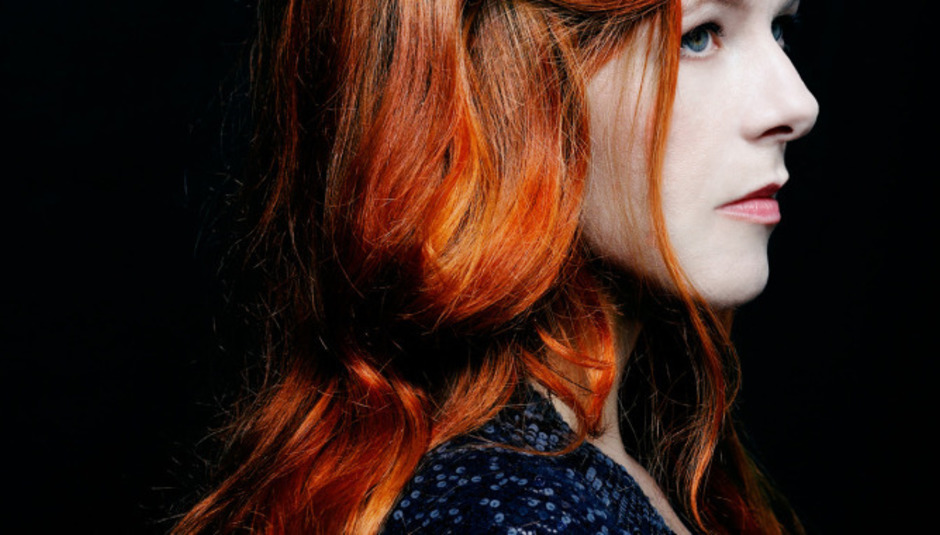The Worse Things Get, The Harder I Fight, The Harder I Fight, The More I Love You is the first album from Neko Case in over four years. It's a hell of a thing, and quite apart from anything she has done before. It is not an easy listen and likely to prod you in some uncomfortable ways.
But that's okay.
As one of the most compelling story-tellers of her generation, while there are many songs in her career which originate from personal experience, they've largely been locked inside a story apart from the person singing them. The singer was not necessarily the songwriter. She was a character. This album is different.
Case had a tougher time in the making of the album, partly as a result of the more prominent place her life played in its creation: “This record was definitely harder in that I had to just come to terms with the fact that these songs were mostly about me which I don’t really like doing and I don’t like working that way. I like to write stories and things of that nature but you know it’s kind of what I could manage so I had to pull myself up by the bootstraps and go 'okay, well you gotta make songs about you work because it’s all you’ve got and hopefully your audience will forgive you'.”
There is a considerable feeling of isolation when you listen to the album. ‘I’m From Nowhere’ and ‘Calling Cards’ express that loneliness in a way that reminded me of Joni Mitchell’s Hejira. Being on the road and in motion can provide escape but it may not provide a satisfied mind. If the problem is your own person, it will be tough to detach from that. The story-telling is just as sharp as it was on Middle Cyclone or Fox Confessor Brings The Flood. There is a sense though of something harsher and more personal here. Even while you have some brilliant lyrical turns that will impress or raise a chuckle, the song is still liable to hit you in a tough way. ‘Bracing For Sunday’ springs incest and murder on you in one line and alters your perception of the song. There is darkness and sometimes desperation to the music, even on songs that don’t at first appear sinister.
The songs are in many ways about being stuck in a bad place without an obvious way out. They are also a result of that experience. “It was a rough one and you know it sounds like I’m trying to make it sound like it’s all dramatic and stuff but really it is. You know when you’re bummed out, well not everybody, but for me it was just you know grief over having lost many family members in a short period of time and I just had to deal with it. And a very normal human adult experience, you know? That kind of depression’s a drag. It’s really monotonous and after a while, you know, when is this going to be over? I’m ready to move on!” It is perhaps this understanding of the sheer boredom involved with depression and all of its related problems that makes the songs ring true.
As low as the mood gets on The Worse Things Get... though, it is still resolutely confident. Not just musically, but the force and honesty with which these low moments are expressed. ‘Man’, the lead single off of the album is ostensibly occupied with gender, but its eye is really on the individual. Like a lot of her music ‘Man’ shifts easily between pointed and insightful, over to wit and humour. Asked if being thought of as a woman first and a musician second bothered her, Neko admits it does, but encounters it infrequently. “I’m pretty aggressive and I’m pretty up front about it so people are pretty respectful. I mean I do it myself. I often immediately categorise women rather than just people. And you know we have, like the English language doesn’t do this but most languages in the world make every single word masculine or feminine. So it’s really hard wired to make the distinction between the two. But those laws are supposed to be on the books."
“It’s like people are a little too close to the earth in a way when they think about it. If you just thought about it like a nature show, you would never deny that a lioness was a lion. So why can’t we all just be men? Like that is literally what we are by law you know? All of us. Man, mankind, that’s us. So if we want to refer to ourselves as men and women, great. And if we want nothing to do with that, like say you’re born as a woman and you don’t feel like one. You don’t want to be one. It doesn’t hurt anybody else. Or if you’re a man and you want to be a woman. Or if you don’t want to be either one! I mean it’s important obviously but it’s ludicrous when you get right down to it.”
There is a wonderful cover of the Nico song ‘Alone’ on the album. From Nico’s third LP, Desertshore, ‘Alone’ fits in nicely with the tone of The Worse Things Get... Nico’s first album Chelsea Girl was basically a greatest hits of the best singer-songwriters of the 1960s. Bob Dylan’s ‘I’ll Keep It With Mine’ was on there, Jackson Browne’s brilliant ‘These Days’ and of course those involving Lou Reed and John Cale. The move to The Marble Index, and then Desertshore was a tough one. Nico placed obscene honesty above the pop hooks and tasteful production that defined her debut. There is a lot of that same honesty to be found on The Worse Things Get...
Speaking about her love of these albums, Neko Case describes them in a way which could easily apply to her new album. “They’re so sparse and startling. Her voice is like no-one else in the world. I find those records really unsettling in a really comforting way. It’s like a weird constant, contradictory in a way. They are high art. And a lot of people think her voice was kind of funny, but no way man! She was the real deal.”
‘Nearly, Midnight, Honolulu’ is likely to get a lot of attention for being “sparse and startling”. As she notes, the story has “been around for a long time verbatim,” yet it is sure to receive more notice now that it has been shaped into an incredibly unsettling song. A “transcription of an actual conversation” Neko overheard, ‘Honolulu’ is just voice and space. Although some would have a problem being so honest in public, Neko asserted that the main problem was finding a way to present such a literal retelling in a way that “didn’t seem cheesy”.
The danger with a lot of created things which document traumatic times in a person’s life is that they are so quickly reduced to the cliché of the cathartic exercise. Or even worse, that hope for “closure”. Neko Case rejects that notion. “I work the whole time. You know, it wasn’t necessarily cathartic but you know it’s what I do so my body and my mind want to do that. But they weren’t like exorcising or catharsis or anything like that.” ‘Honolulu’ is not an attempt to wipe away a bad experience as if by magic, but merely an attempt to document one. It is not to forget, but to remember. As Neko sings, “Well I just want to say that it happened, ‘cause one day when you ask yourself did it really happen, you won’t believe it, but yes it did and I’m sorry.”
Tracyanne Campbell from Camera Obscura helps out with the vocals on ‘Honolulu’, one of many guests on the album. Neko named the new Camera Obscura album as one of her current favourites. “It makes me sound like a dick because I sang on it but I sang on it because I love them so much and their music is so good.” Given her habit of working with people who she likes and respects, it should come as no surprise. Collaborator and band member Paul Rigby co-wrote five of the tracks with Neko and arranged a sixth. “Mostly it’s me going okay I want to stick these things, can you play me up a cool chord that will go from here to there? So he would play me every chord and go oh that would work.”
The Worse Things Get... includes folks from My Morning Jacket, Los Lobos, Calexico, a pair of friends from The New Pornographers, among others. ‘Night Still Comes’ features the distinctive cry of Jim James which gives the chorus a particularly mournful quality. “I don’t like to go into the studio for a few weeks and have there be a limit like okay you gotta get this done by then. That doesn’t really fit my process at all. I like to spend a lot of time working with them. Generally I know them. You know there are people that are very dear to me so I want the experience of being in the studio (to be) a time of not just two weeks at a time. It’s family time basically. I don’t have a, you know a husband or any kids and I don’t really have any family. It’s nice for me to sort of have that connection.”
“You know I always ask people that I know they’re really great at what they do and so I don’t really spend a lot of time bossing anyone around. It’s usually pretty streamlined. You don’t have to work super hard. You don’t want it to just fly by, like I don’t want to take it for granted. Not that people doing a record in a few weeks is taking it for granted. You know it can be expensive and that’s what you have to work with sometimes but if you can make it happen a little slower, I enjoy that.”
Those who work in genres that place a high value on live performance can be prickly when it comes to the impact of the studio on their music. Bill Evans famously went against the standard of live in-studio performances with Conversations With Myself and used overdubs to do something that could not be done on stage. While overdubs are not as taboo in the Country, and Traditional areas there is still that sense that taking full advantage of the studio and digital technology is somehow inauthentic. Jack White’s complaint that digital recording is too easy or loses the “soul” of a recording is pretty common to hear.
The Worse Things Get is very much an album which does not seek to replicate a live performance, but to craft a unique mood. 'Where Did I Leave That Fire' is a song that benefits in this way, with a gloomy approach that sounds best when alone at four in the morning with the headphones on. There is a carefully crafted sound here that puts you in the right place. Perhaps it is because Neko Case also exists just as comfortably as an Indie Rock sort, or because she has a canny understanding of the versatility of her music, but she is comfortable with the place of technology.
“The songs don’t come into full form for me until I’ve dealt with them in the studio. It’s just another arm of creativity. I totally respect people when people want it to be just as much of the performance as possible. I love figuring out what you can do with the marriage of digital and analogue together and just spending time with the songs. Ideas make other ideas. It makes them like rabbits and so just figuring out which ones to chase down is really challenging. And so on one hand it is great, because your ears become a lot sharper and you know better how to explain things that you want. You’re really open to hearing more problems than you used to be able. So you know it’s kind of awesome because it also makes you a better editor, which is another facet of the part of doing it.”
Neko is less certain about whether technology has changed the distribution of music for the better. “I’m not into people doing things with the music without asking me first. The thing is that making music is really expensive and it takes a lot of work and musicians, they deserve to get paid and they deserve to own their own content. ‘Cause music is the most used art-form in the world. It is the most taken for granted. It’s everywhere. And that is awesome but it also makes people you know entitled too. I mean it is not an easy life to do music full time. There’s very few of us in the Britney Spears category. Most of us are either poor or pretty blue collar, so we don’t really make our money from publishing mostly, at least those of us in the blue collar to poor range. But we do rely on the effects from publishing, we really do.”
Speaking about early free music/sharing culture and the people who started it, she suggested that while people thought they were fucking over “The Man,” they were also fucking over musicians. “They didn’t ask. Nobody asked us what we thought. It’s like coming into your job and taking your work and going “Yeah we’re not going to pay you. It’s really good work! We’re doing this to fuck over your boss! We hate your boss.” And we’re like what do I have to do with this guy?”
“On the other hand like, I am totally amenable to some kid in rural Saskatchewan being able to hear the music if he’s totally broke. Technology moves so fast that we’ve never been able to reach a happy medium where everybody gets what they need. I think the pros do outweigh the cons. I love the fact that a 16 year old kid can make their own album in their bedroom. I think that is fucking beautiful and amazing and then someone in Hong Kong can get it. It’s fucking cool and it brings the world closer together. And you know it’s great to be able to stream things if you’re not into the packaging, ‘cause that is a much better thing for the earth. As far as sticking up for musicians, we deserve to make money for what we do and it’s an important job. I see the filthiest bathrooms in the world on a daily basis.”
The Worse Things Get, The Harder I Fight, The Harder I Fight, The More I Love You is out Sept 2nd via ANTI.






















